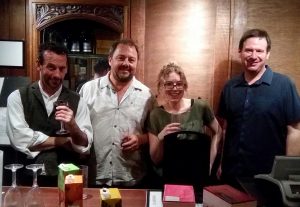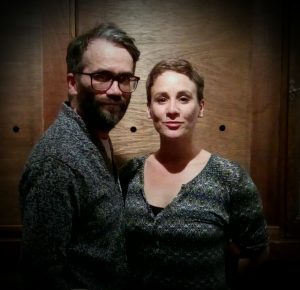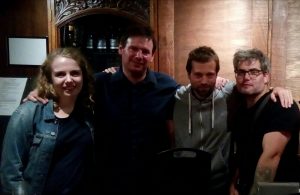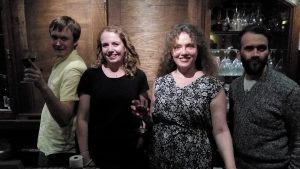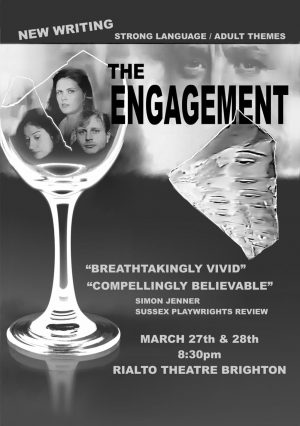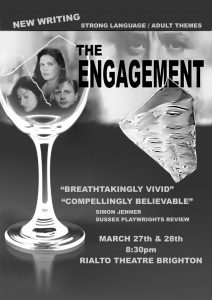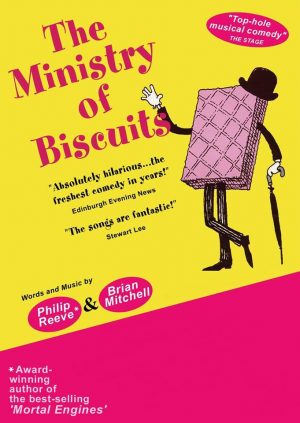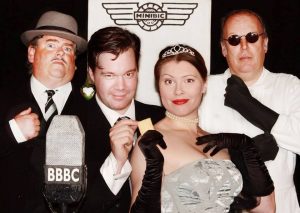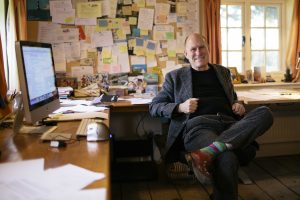Writers’ Night
Sussex Playwrights host a monthly playwrights’ meetup night – writers of film, theatre, TV, radio, online drama, plus actors, directors, producers, crew and their friends are welcome to come along for networking, sharing writing, reading and discussing their work.
This month, we hosted some live readings of short extracts / short plays / works in progress / finished pieces.
Thanks to the Playwrights Roz Scott, Peter Gardiner and Tristan Wolfe and all the readers, who got the plays on their feet and sparked lively audience discussions.
Simon Jenner’s report:
Sussex Playwrights Quartet February 4th 2018
Sussex Playwrights thrives on a tradition of performing shorts, indeed these provide the staple fare for workshopping, extending and the busy rewrites inevitably following a try-out or rehearsed reading.
What’s particularly refreshing is how carefully put together these selections are. Pippa Hammond and Thomas Everchild must be congratulated on this. It works tellingly and allows dramatists, actors and audience to reflect on different approaches to a similar theme. Tonight, two plays are about coming out, one about the outfall of a relationship triggering latent expression; finally one dealing with sex call centres and here, heterosexual insecurity. All deal with mental distress in some form. Maria, the longest, foregrounds this rather than sexual relationships.
It’s doubly important now as SP moves into pre-production readings – that is, like The Engagement so superbly realized last month, which Thomas Everchild is producing for Hove Grown with a new cast – these plays too are up for Hove Grown and even the Fringe.
Two of these plays have undergone immediate rewrites since being performed here so I’ll not be giving too much away. The small company of actors who interlaced the four productions were neatly co-ordinated by Pippa Hammond who played one part.
The quartet of plays performed were necessarily more rehearsed readings than last month’s performance. Still, with several professional actors again engaged there was a real spark, particularly to the last.
Tristan Wolfe Finding Yourself Offside
In this gentle play in the tradition of Peter Gill, we discover a man talking through his anxieties in the face of some incomprehension. To a therapist. There are hankies. That isn’t the point though. He’s a footballer and coming out is still virtually unknown despite all the positive exhortations in media and even sports commentaries.
Wolfe’s cast were Barbara Halsey, Cosmo Rana-Iozzi and Daren Callow.
The title’s punning reference to sport and the divides of machismo and sexuality is neatly summarized. Therapist Barbara Halsey attempts to deal with the sportsman’s sexual anxieties, whilst male protagonists Rana-Iozzi and Callow tenderly unravel mutual attraction through a chance encounter outside. It’s a play reminding us of that tradition more overt from the 1990s, where talking in quiet attenuated moments of drama can be telling. Wolfe’s vignette seeks to establish a discourse prior to the engagement of the two men. That is, we’re exposed at the end to a possible relationship, as if this short were a beginning of something too.
Halsey creates a good few nuances as do both Rana-Iozzi and Callow. Themed like this it has fine triangular potential and there’s a difference to other plays about coming out. Gill for instance wouldn’t bother with a therapist: his plays usually deal with those already out to themselves. So this work could explore more tentative territory. It neatly counterpoints the play immediately succeeding it by Peter Gardiner.
Wolfe’s currently rewriting his play along lines explored in the post-show discussion. We look forward to a remodeled, and with luck more extended treatment.
Peter Gardiner Late to the Party
As Gardiner puts it: ‘An older couple experiment with visiting a 1980s gay bar’. It’s as weird as that. But it isn’t of course. We’re a laugh away from the winced coming out of the previous play, but it’s ultimately as tender, as exploratory and potentially painful. Here though, there’s been a gentle resolution and this scenario deals with the last part of that resolve.
Russell Shaw, Laura Savage and Daren Callow form a happy trio. Are this elderly couple really aware they’ve entered a gay bar? It’s the 1980s, not many people from up north have even heard of such things. They’ve clearly got it wrong suggests Callow’s bartender.
No they haven’t. Shaw utilizes his northern roots to telling effect as a man who’s taken so many years to come out openly that he’s retired. But this is no ordinary late coming-out. Savage as his sympathetic wife has always known, and theirs is a mutually loving, supportive relationship. Indeed it’s so tolerant that it’s she who’s suggested the gay bar.
This is an attractive if slightly anachronistic-seeming piece only in that one wonders how many northern couples would be that enlightened and dare to come down in the 1980s. But that’s the weasel under the cocktail cabinet, as Pinter once reflected, asked what his plays were about. In real life there really are weasels under cocktail cabinets and such a couple might well have pioneered such a move.
Shaw as ever finds a dimension by fracturing out the vulnerability behind the burling persona: one of the things he excels in. Savage finds a sympathetic nuance though her character doesn’t enjoy quite such a journey. Nevertheless Savage, hardly near retirement age, warms the edges of a woman valuing love, courage and tenderness in the face of overt sexual braggadocio. We learn that touchingly, her future husband had stood up to her father and others, made made her life possible. Again sexual stereotypes are overturned. He’d been her hero, standing up to her bullying father and liberating her: an act of love.
Callow excels as the knowing bartender, drawn in to the couple’s sympathetic ambit, happily at a quiet point of the day.
This play enjoys a surprise at its outset, and a revelation of what women often want towards its close. It’s difficult to see how this might be extended, but Gardiner reveals in two plays he has the knack of piling on surprises, so who knows?
Roz Scott Maria
Roz Scott’s debut play is to be performed in Hove Grown, and subsequent on this performance it’s undergoing rewrites: the final draft tells us more.
It’s an ambitious debut, dealing head-on with mental distress, alienation, a bleached narrative that hollows out conventional happenings: merely scalloped indents at the edges of the eponymous Maria’s brain.
It’s what clinical depression is like. Malignant Sadness as the psychiatrist Lewis Wolpert described it, from the inside.
Maria’s synopsis is evocatively straightforward, a narrative-based work. ‘Maria is an insider’s look at mental illness. It explores the cold isolation that emerges from deep in a depressed person’s soul and the glass doors that spring up all around. Everyone wants to help but no-one can.’
This is chillingly accurate. Maria starts with a saving of the protagonist’s life in busy Piccadilly, from a heavy truck. We then revert to familiar territory: familial incomprehension sufferers will know well. Here it’s Maria’s marriage that propels her to this. ‘The everyday dismissiveness, the arrogance, point scoring, the slow, relentless drip,’ though sometimes depression doesn’t have obvious triggers, which Maria explores with insistent, lapping evocation. Indeed we end near the shore. The gentle colloquies with Maria’s mother, counterpoints can-do sister Karen, unintentionally a living reproof of coping.
The third scene with snappier sibling dialogue is more engaging: shorter lines, less exposition needed. One wonders if such narrative interludes are necessary. Karen and their mother Libby now engage in the one dialogue where Maria’s not present. Although it shifts us from Maria’s envelope, this works as welcome relief, a normative dialogue where ‘normality’ as such is tested.
There’s a couple of evocative moments; Scott should certainly concentrate on her lyrically descriptive gifts, though this might be realized more energetically.
When asked: “How are you?” Maria sometimes answers simply: “Yes. I am here.” She feels plain and very, very small, very ordinary.
Narrator: Maria remembers lyrics by Jane Gilbert, a Scottish singer songwriter: “He has taken away the sun,” her world is washed in grey like a February sky.
After another colloquy with her mother and sister Maria encounters John on a Lowestoft beach. He’s the man who saved her life in London, has moved here. It’s an affirmative but inconclusive long walk, open-ended. But Maria ‘feels for the first time that there is a life beyond, as well as behind.’
Mary Rees played Maria with a muted raptness, Barbara Halsey was the empathic and occasionally bewildered Libby, Philippa Hammond narrated with pointed understatement, Laura Savage made a fine job of coaxing out the mildly infuriated side of sister-who-can, Alex. Tristan Wolfe was a gentle, firm giant as John and delivered Maria’s ex Jack’s one nasty little line.
This play’s evolving with real potential. Scott can let go of over-explanations, trust to images and sheer story-telling. She has a finely-grounded one with an acuity of insight and a lyrically-charged gift that literally pictures the un-nameable pearl-grey blanket of depression occluding Maria’s living. Like the spectrums she invokes, these are telling enough. It’s emerging as a confident debut of a theme where all confidence is shredded.
Peter Gardiner Please Hold
Gardiner returns for the final play. This proves a riot and a showcase of Gardiner’s exuberantly button-holing style – one where you can be confident of payoff and a satisfying finish as they say off singe malts.
It’s a call centre, of sorts, the type that sued to be termed 0898, in the early 1990s. Mjka Scott, Brighton and Hove Equity chair, was most informative about the rates earned by young women. Half in fact on this high-rate calls, which were even then at £10 per minute.
Gardiner’s cheerful scenario puts me in mind of Barnes’ People, Peter Barnes’ radio plays from 1985-7. in particular The Moon Dog and the Mighty Hamster where two women wrestlers discuss how they’ll fight, carefully choreograph to avoid injuring each other. Gardiner’s piece renews that kind of complicit hilarity.
The two women working on a sex line in ‘conversation’ with clients, Mary Rees and Philippa Hammond enjoy – and deploy – a badinage. It’s partly genuine camaraderie, partly their relatively well-paid jobs, and of course the faux-bonhomie expressed to the punters. Disparities between what these workshift-dressed women wear and what they say they’re donning for each client with their particular smorgasbord of wish lists is as ever delectably silly.
It’s as old as Ben Jonson’s The Alchemist, with its hapless line of cozened punters – each dispatched this way and that to Hammond’s and Rees’ conspiratorial laughter. Here at least though the fantasies can be realized after a fashion. Rees discusses her husband out of a job, depressed, not able to satisfy her. The locally-sourced grunge of their real lives forms a poignant contrast to the fantasy selves they fuel their clients with.
The regulars call spending thousands one feels, and we get newbies too. The line-up of Daren Callow, Russell Shaw, Tristan Wolfe and Peter Gardiner with degrees of haplessness and confidence is enthralling and of course there’s a twist you might predict. Gardiner’s good at not making it the fulcrum of the play and he might extend this further. The male actors too manage their displaced selves with aplomb; sadness seeps through, and something of the truth too.
Theatrically this is shaping up to be a winner: the actors clearly feel it and raise their comedic game. A great rounding-off.

